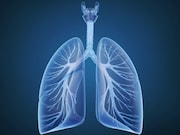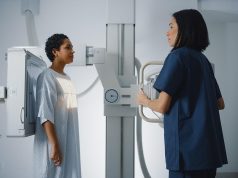In some situations, model outperformed radiologists with reductions in false positives, negatives
TUESDAY, May 28, 2019 (HealthDay News) — Deep learning models can improve the accuracy of lung cancer screening, according to a study published online May 20 in Nature Medicine.
Diego Ardila, from Google AI in Mountain View, California, and colleagues proposed a deep learning algorithm to predict the risk for lung cancer using a patient’s current and prior computed tomography volumes. The approach included three key components: construction of a three-dimensional convolutional neural network (CNN) model that performs end-to-end analysis of whole computed tomography volumes, training a CNN region-of-interest detection model, and developing a CNN cancer risk prediction model that uses outputs from both models.
The researchers found that the model achieved an area under the curve of 94.4 percent on 6,716 National Lung Cancer Screening Trial cases. Performance was similar on an independent clinical validation set of 1,139 cases. The model outperformed six radiologists when prior computed tomography imaging was not available, with absolute reductions of 11 percent in false positives and 5 percent in false negatives. Model performance was on par with the same radiologists when prior computed tomography imaging was available.
“Our work examines ways artificial intelligence can be used to improve the accuracy and optimize the screening process in ways that could help with the implementation of screening programs,” a coauthor said in a statement. “The results are promising, and we look forward to continuing our work with partners and peers.”
One author disclosed financial ties to the biotechnology industry. Several authors disclosed ties to Google Inc., which funded the study.
Copyright © 2019 HealthDay. All rights reserved.








